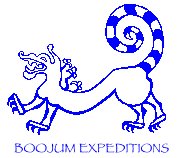Article on Wolf Hunting in Mongolia
Darhad
Migration Warming Huts Project

Synopsis:
A program of Boojum Expeditions of
Bozeman, Montana to develop communications and cooperation between
Mongolia and Montana on issues of mutual concern regarding:
- Preserving and protecting hunting traditions
- Hunting as a contributor to wildlife and habitat management
- Predator and poaching issues
- Coordinating information and strategies from similar bioregions.
The Mongolia/Montana Hunting Exchange consists of two components, 1:
Montanans to Mongolia and 2: Mongolians to Montana.
Montanans to Mongolia
The purpose of Montanans to Mongolia is to bring small groups of American hunters to Mongolia to participate in the revival of traditional Fall hunts for wolf and boar. The Mongolian participants from Mongolians to Montana would act as hosts and organize their local community to prepare the facilities, horses, vehicles and people for a week long hunt. Of a total of 8 hunters, 5 would be American and 3 Mongolian (local community and political leaders, environmental specialists, researchers, etc.) Hunting would be done with 8 identical rifles fitted with iron sights only. The use of iron sights exclusively is intended to put the emphasis on skill rather than technology. Hunters would hunt cooperatively; this is not a trophy hunt and no trophies will be taken out of Mongolia.
The purpose of these hunts is, in order of priority:
1. Revive the traditional, community based activity
of hunting wolves in Fall, reminding wolves and other predators to be
wary of herders during the difficult winter months.
2. Provide income to the local community from a
brand new form of tourism, a way of hunting that is consistent with the
traditions and values of Mongolian culture.
3. Enhance the value of wolves in the community's perception
(beyond existing traditional respect) by making wolves an economic asset
and partly offsetting the negative aspects of predation on domestic animals
through funding of a compensation fund.
4. Share a common interest in hunting, wildlife,
marksmanship and other outdoor pursuits between Mongolian and American
culture.
5. Obtain meat (boar) for winter use by the local
community.
Traditional Hunts versus Trophy Hunting:
Mongolia has offered expensive trophy hunting to foreigners for many years, and the revenue is an important addition to the Mongolian economy. However, the monopoly that trophy hunting has on all hunting by foreigners means that additional important revenue is not realized. Trophy hunting tends to put most of the income into the general fund of the National Treasury, with relatively little reaching the local communities. Traditional Hunts will target the income directly into local communities who, through their participation in the event, will be able to see how much income is earned and know exactly how that income is allocated. Because wolf and boar are widely distributed throughout Mongolia, community leaders will understand that any malfeasance on their part will result in the permanent loss of future hunts, which will simply be moved to the next community eager to participate. The hunt is designed for maximun fealty to the idea of a traditional, cooperative hunt as opposed to emphasizing killing efficiency or guaranteeing results to the foreign hunters.
Prospective hunters who consider failure to kill a wolf a "failed hunt" should not participate.
Mongolians to Montana:
The purpose of Mongolians to Montana is to bring small groups of Mongolian
herders/hunters to Montana to participate in a variety of activities which
illustrate the current system of licensing hunting, taxes paid by hunters
and the application of funds raised from hunting activities to wildlife
and habitat mangement, including law enforcement. The pilot program
calls for 2-3 Mongolians, chosen for their
experience as both hunters and herders (Mongolian equivalent of a rancher)
and their strong reputation in their communities, to visit Montana during
hunting season and accompany local, private hunters on a variety of hunts.
In addition, seminars and educational forums would be held for the Mongolian
visitors by FWP, Montana State University and other interested environmental
and sportsmen's groups.
In addition to observing the way Montanas hunt and manage hunting,
the Mongolians would also be introduced to fishing as an economic resource
for tourism and other activities (rafting, hiking, mountain biking).
A visit to Yellowstone National Park and meetings with Park staff would
be included, to emphasize the role that Parks and Protected Areas play
in the entire scheme of wildlife management.
Meetings will be organized with community members, ranchers and others
to discuss the issue of wolves and predators and other pressures that
effect the herdsman/rancher.
Of particular note is that the Mongolians would be chosen from "plain folks" instead of from the ranks of government officials or academics. We feel that this approach will improve the degree to which information gained and perspectives learned by the Mongolians will be disseminated and accepted in the countryside population.
Budget: Approximately $12,000.00 USD for airfare, visas, travel
expenses, translation. The Mongolian participants will be housed
in "home stays" with private individuals.